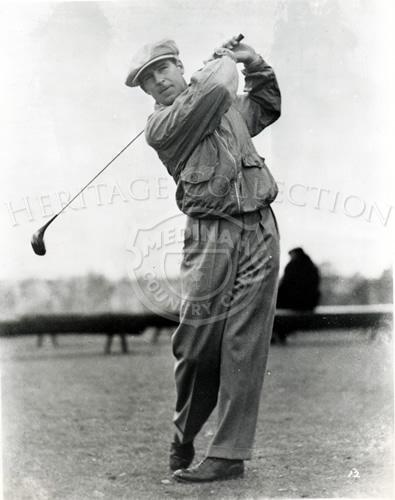The Golf Wisdom of Lighthorse Harry Cooper, Part II
[In talking with Harry Cooper on those long ago sunny afternoons, the conversation shifted to the early days of the tour, and what golf was like in the Twenties, and Harry began to recall players that time, as well as the changes in the game.]
II
When I first started to play down in Texas, we had to put together our set of clubs. In fact, I was the second-to-last professional to shift from wood to steel shafts. Max Smith, I know, was the very last.
At the time–and this would be in the Twenties–one had to put together a ‘set’ of clubs, for there were no two clubs that were just alike. It wasn’t until the early Thirties when they developed a system of golf club uniformity. Before then you might have ten mashie-niblicks and not two of them had the same loft. So we put together the best set of clubs by picking and choosing, and we went out and played on the PGA tour.
It wasn’t much of a tour then. In fact, during the Depression the PGA actually gave up on it, thinking no one would come out to see a bunch of pros play golf. At the time, Fred Corcoran was the tournament director for the PGA and when about twenty-five of us got together and resigned from the organization, we hired Fred to continue the tournament for us.
Well, when the PGA learned this, they decided to go ahead with the tour, and we agreed and that became the PGA Tour that we have today.
Even though I was on the tour, playing against each other, we were also helping each other as best we could. I remember once I was playing in City Park, New Orleans, playing with Ben Hogan. Every green had a bunker in front, so you had to play with backspin on the green. Well, Ben was duck-hooking everything. He couldn’t get the ball off the ground, and he asked me for some help.
This was in ’37; it was the year I won the New Orleans Open.
So after the round, we went across the railroad tracks–that’s where the practice area was at City Park–and I watched him for awhile, and I caught was he was doing wrong. He was letting go of the club at the top of his swing and then regripping it. It’s a little thing, but the minute you let go and then regrip, it shuts the face of the club. Can’t help but shut the face, and that was what Ben was doing. I finally got him hitting the ball, getting it up in the air and keeping it flying and hitting it straight.
Keeping the ball in the fairway is what this game is all about. You watch a tournament on television and half those fellows are off in the rough. I was looking at some old clips awhile back, and I noticed that some reporters during the Twenties and Thirties used to call me “The Machine,” just like they called Gene Littler a few years ago. We’re both the same kind of player. We keep the ball on the fairway. We keep it in play.
Now, the reason most people don’t keep the ball in play is that they make a basic mistake. The average golfer leads from his right shoulder. But if you lead the swing from the point of the left hip–going to first base, for example, instead of third base–you automatically keep the right shoulder back.
Also, you have to realize you don’t hit the ball with the back swing. Accelerate speed as you’re coming down, not going back. And keep accelerating. Hit from the bottom of the swing, not the top. If you hit from the top, then there’s nothing left to carry you through the bottom.
I believe anyone with the normal athletic skills can become a good player. Hogan said it once, and I agree, that anyone with normal coordination and strength, who has the time, can shoot in the 70s. That’s true enough.
The secret of this game really is the person himself. Golf isn’t an easy game. But it is a rewarding one. It is the only sports where anyone, regardless of skill or age or handicap, can at one time or the other hit a golf ball just like a professional. Just like Nicklaus or Palmer.
And having hit the ball just once like a pro makes us all want to come out to the course and play again. That’s why golf is such a great sport. And a sport for a lifetime.
Look at me! I’m approaching the end of my eighties, and I still believe that one of these days soon I’ll lick this game.
If I think so, then you can, too!
[Harry Cooper would play golf, and keep teaching his simple approach to the game, for another decade. He would pass away on October 17, 2000, at the age of 96. He never won the Masters, the PGA or the U.S. Open, but he did win 36 times on Tour, including the ’34 Western Open which was considered one of golf’s top tournaments at the time, and today he is known as the greatest golfer to play the game and never win a major.]
No comments yet.
Add your comment